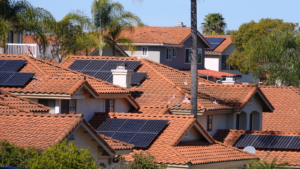The task today is to find three smart energy stocks for 2024. That’s easier said than done.
One needs to define what “smart energy” actually means.
According to CNET.com, smart energy systems enable consumers to remotely save money on their electricity bills, optimize their solar panels, and provide a thorough understanding of their home’s energy consumption.
All three of these things can be obtained through an app on your phone that provides real-time data about your energy usage.
Who provides this kind of system? That’s a mystery I’ll try to solve. There’s no question that firms such as Google’s Nest and Amazon’s (NASDAQ:AMZN) Smart Thermostat provide smart devices to help save you money. I’m not sure that hits the right note, but you could do worse than investing in either of these companies.
However, to ensure we get a trio of diverse names, I’ll select three names from the SoFi Smart Energy ETF (NYSEARCA:ENRG), which tracks the performance of the iClima Distributed Renewable Energy Index, a collection of distributed energy companies.
These are businesses that help in some way to generate electricity “in a decentralized way, at the point of consumption,” states the ETF’s summary prospectus. It’s a broad scope.
Here are my three smart energy stocks.
Smart Energy Stocks 2024: Altus Power (AMPS)

Altus Power (NYSE:AMPS) is the eighth-largest holding in ENRFG with a weighting of 2.79%.
I had never heard of Altus – perhaps because its market capitalization is less than $1 billion – but it does a lot of stuff in the solar arena.
“Our services range from on-site solar generation for Commercial, Industrial, and Public Customers to Community Solar, energy storage, and Electric Vehicle charging, all of which are tailored to each client’s needs and energy usage profile,” states its home page.
Its goal is to provide clean energy to every home, business, and electric vehicle (EV). No wonder its stock is trading within pennies of penny-stock status. Clean energy stocks of all sizes have gotten hammered over the past year as consumers and businesses waffle over the energy transition from fossil fuels.
As it relates to Altus, the good news is that it’s profitable. In the nine months ended Sept. 30, it generated an operating income of $22.5 million on $121.0 million in revenue. The top and bottom lines were both up considerably from a year ago.
For 2023, it expects adjusted EBITDA of $100 million at the midpoint of its guidance, 70% higher than in 2022. Its adjusted EBITDA margin should be between 55% and 59%.
The margin seems conservative. Through the first nine months, it was 63%, 600 basis points higher than a year earlier.
This is an excellent buy for risk-tolerant investors.
Schneider Electric (SBGSY)

Schneider Electric (OTCMKTS:SBGSY) is the largest of the smart energy stocks, with a market cap of $111 billion. It is the fourth-largest holding of ENRG with a weighting of 2.89%.
A year ago at CES (Consumer Electronics Show) in Las Vegas, the French company unveiled Schneider Home energy management solution for homeowners.
“There’s never been a greater need for transformation or a greater opportunity for positive impact and innovation is how we empower consumers on their path to net zero,” stated Nadege Petit, Executive Vice President, Innovation at Schneider Electric.
“Homeowners are now able to produce their own energy and seamlessly switch between power sources to optimize cost. Schneider Home provides them the tools for a self-sufficient home, reducing their environmental impact, while saving them money on their energy bills.”
While Google’s Nest is a smart thermostat, Scheider Home is the entire infrastructure necessary to manage power consumption in the home.
Five integrated tools work to make Schneider Home so innovative. They include a smart electrical panel, a home battery for storing solar energy for use later, an inverter to convert solar energy into AC electricity, an EV charger, and an app to control all of these products.
This all-in-one solution won a 2023 Innovation Award at CES.
As a result of Schneider Home, the company expects 2023 organic revenue growth of 12% at the mid-point of its guidance with adjusted EBITA of 20.5%.
Up 178% over the past five years, investors can expect more of the same in the next five.
EnerSys (ENS)

EnerSys (NYSE:ENS) is the 17th-largest holding with a 2.61% weighting. Don’t stress if you own the stock.
The ETF is reconstituted 20 days before the first Wednesday in February and August. At the time, the 47 holdings are equally weighted. Based on 47 holdings, the average weight at reconstitution is 2.13%, so it’s up from its last reconstitution this past August.
EnerSys provides energy storage and power solutions for industrial applications. It manufactures and distributes energy systems solutions, motive power batteries, specialty batteries, battery chargers, power equipment, battery accessories and outdoor thermal equipment enclosures solutions to more than 10,000 customers worldwide.
It has three operating segments: Energy Systems (47% of revenue), Motive Power (39%), and Specialty (14%).
Its Energy Systems provides uninterruptible power systems (UPS) applications for vital infrastructures such as data centers, utilities, telecom, and many other industries. Motive Power provides batteries for electric forklifts, and Specialty involves premium battteries for specialized uses.
Approximately 73% of its revenue is from the Americas, with the rest split between Europe, the Middle East, Africa, and Asia.
In fiscal 2023 (March year-end), it had $3.7 billion in revenue, up from $2.4 billion in 2017, and a CAGR of 7.5%. The company’s three serviceable addressable markets add up to $30 billion, which suggests it’s got a long growth pathway ahead of it.
In the latest quarter (Q2 2024), its sales were $901 million, basically flat to a year ago, with an adjusted operating profit of $103.5 million, 58.3% higher than a year earlier.
On the date of publication, Will Ashworth did not have (either directly or indirectly) any positions in the securities mentioned in this article. The opinions expressed in this article are those of the writer, subject to the InvestorPlace.com Publishing Guidelines.
